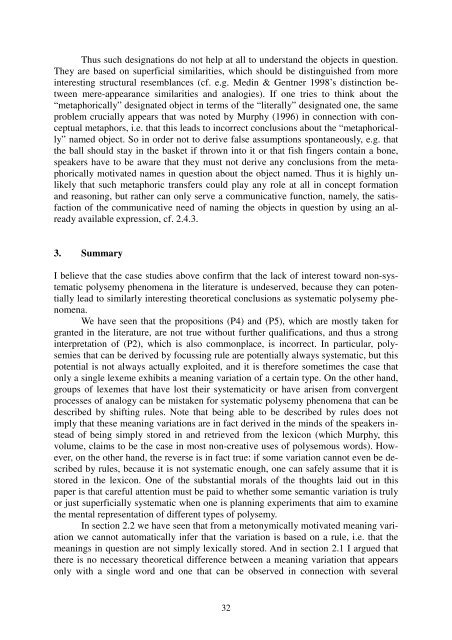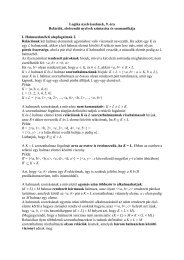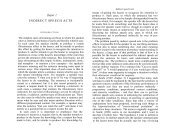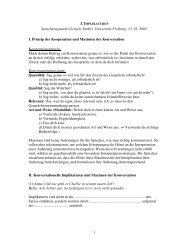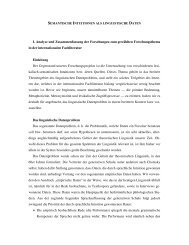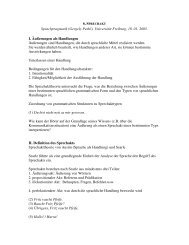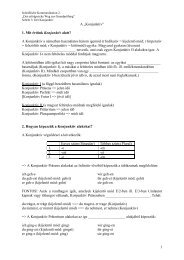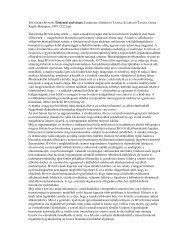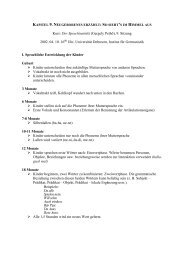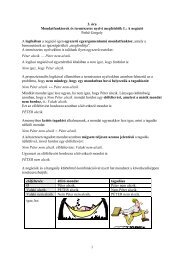On irregular polysemy* Gergely Pethő
On irregular polysemy* Gergely Pethő
On irregular polysemy* Gergely Pethő
You also want an ePaper? Increase the reach of your titles
YUMPU automatically turns print PDFs into web optimized ePapers that Google loves.
Thus such designations do not help at all to understand the objects in question.<br />
They are based on superficial similarities, which should be distinguished from more<br />
interesting structural resemblances (cf. e.g. Medin & Gentner 1998’s distinction between<br />
mere-appearance similarities and analogies). If one tries to think about the<br />
“metaphorically” designated object in terms of the “literally” designated one, the same<br />
problem crucially appears that was noted by Murphy (1996) in connection with conceptual<br />
metaphors, i.e. that this leads to incorrect conclusions about the “metaphorically”<br />
named object. So in order not to derive false assumptions spontaneously, e.g. that<br />
the ball should stay in the basket if thrown into it or that fish fingers contain a bone,<br />
speakers have to be aware that they must not derive any conclusions from the metaphorically<br />
motivated names in question about the object named. Thus it is highly unlikely<br />
that such metaphoric transfers could play any role at all in concept formation<br />
and reasoning, but rather can only serve a communicative function, namely, the satisfaction<br />
of the communicative need of naming the objects in question by using an already<br />
available expression, cf. 2.4.3.<br />
3. Summary<br />
I believe that the case studies above confirm that the lack of interest toward non-systematic<br />
polysemy phenomena in the literature is undeserved, because they can potentially<br />
lead to similarly interesting theoretical conclusions as systematic polysemy phenomena.<br />
We have seen that the propositions (P4) and (P5), which are mostly taken for<br />
granted in the literature, are not true without further qualifications, and thus a strong<br />
interpretation of (P2), which is also commonplace, is incorrect. In particular, polysemies<br />
that can be derived by focussing rule are potentially always systematic, but this<br />
potential is not always actually exploited, and it is therefore sometimes the case that<br />
only a single lexeme exhibits a meaning variation of a certain type. <strong>On</strong> the other hand,<br />
groups of lexemes that have lost their systematicity or have arisen from convergent<br />
processes of analogy can be mistaken for systematic polysemy phenomena that can be<br />
described by shifting rules. Note that being able to be described by rules does not<br />
imply that these meaning variations are in fact derived in the minds of the speakers instead<br />
of being simply stored in and retrieved from the lexicon (which Murphy, this<br />
volume, claims to be the case in most non-creative uses of polysemous words). However,<br />
on the other hand, the reverse is in fact true: if some variation cannot even be described<br />
by rules, because it is not systematic enough, one can safely assume that it is<br />
stored in the lexicon. <strong>On</strong>e of the substantial morals of the thoughts laid out in this<br />
paper is that careful attention must be paid to whether some semantic variation is truly<br />
or just superficially systematic when one is planning experiments that aim to examine<br />
the mental representation of different types of polysemy.<br />
In section 2.2 we have seen that from a metonymically motivated meaning variation<br />
we cannot automatically infer that the variation is based on a rule, i.e. that the<br />
meanings in question are not simply lexically stored. And in section 2.1 I argued that<br />
there is no necessary theoretical difference between a meaning variation that appears<br />
only with a single word and one that can be observed in connection with several<br />
32


